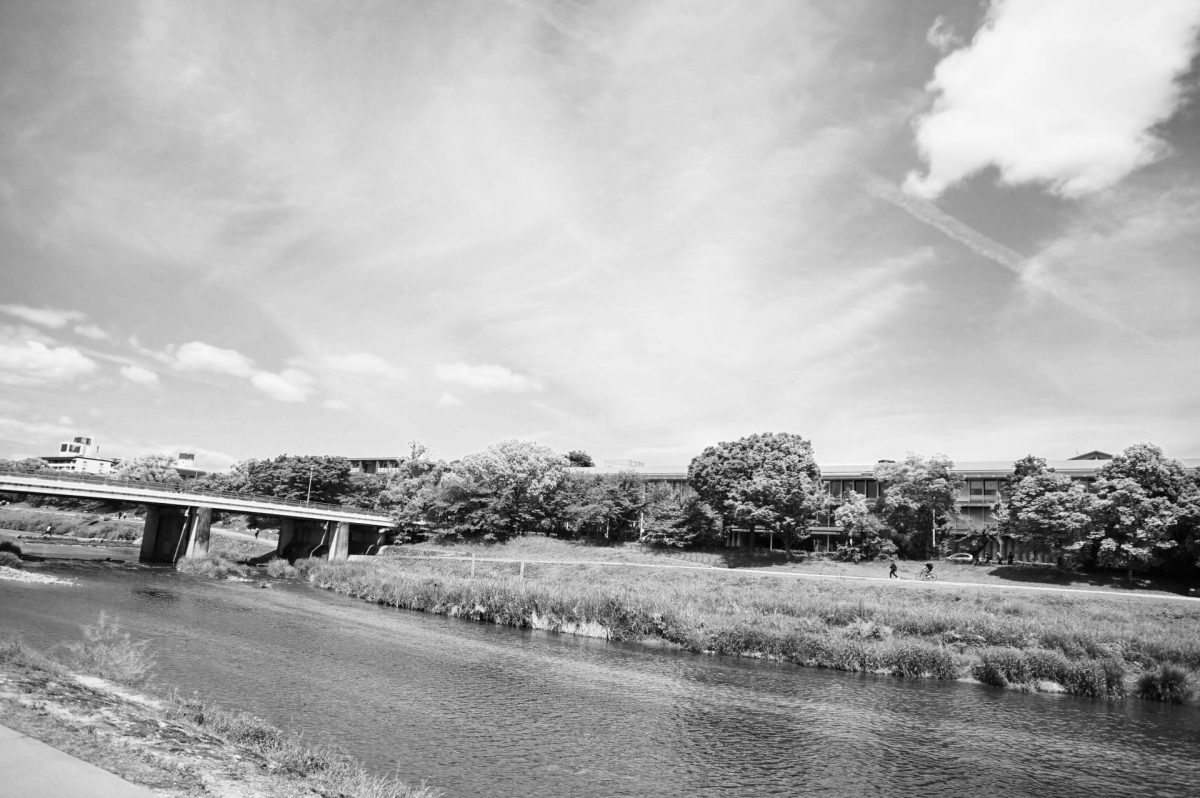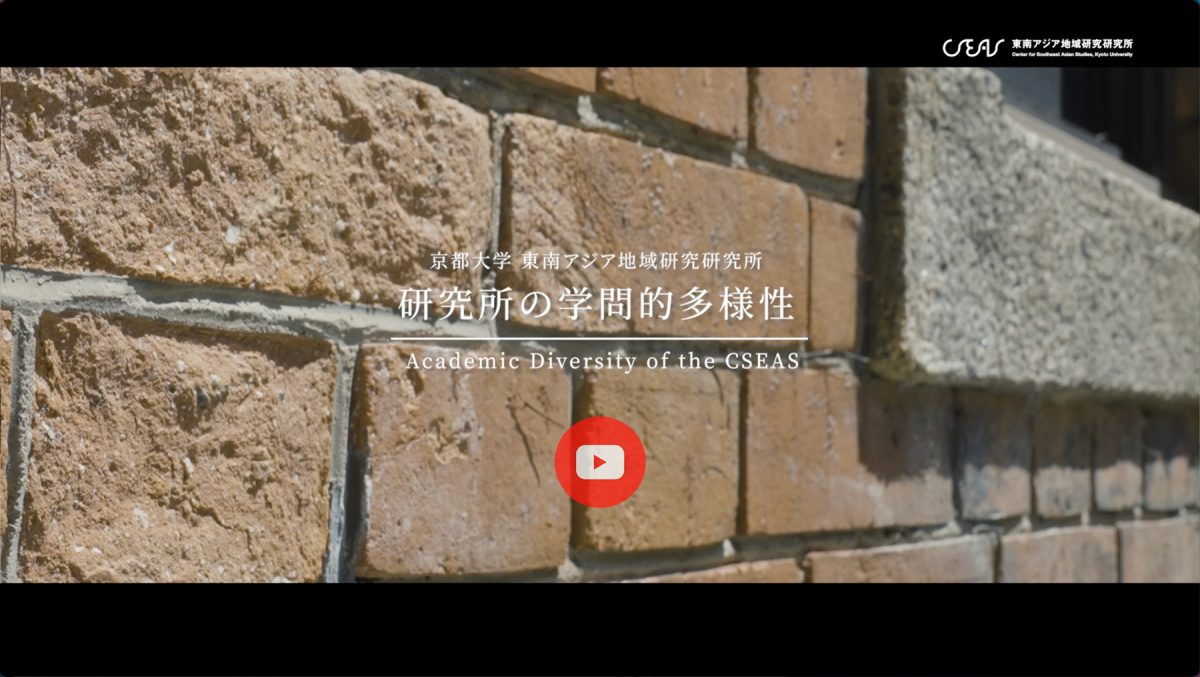Greetings from CSEAS

Greetings and welcome to CSEAS. My name is Fumiharu Mieno, the Director of the Center for Southeast Asian Studies (CSEAS) since April 1 2022. My research area is economic development and finance systems, with a primary focus on Thailand, Myanmar and Laos, studying the characteristics of economic systems including financial institutions and corporations. With empirical research that focuses on regions such Southeast Asian studies there is a need for the integration of two different academic approaches: discipline-based frameworks for the systematic understanding of phenomena, and area studies-based skills for observing “what is actually happening and occurring there.”
One distinct characteristic of CSEAS is the diversity of research fields covered by faculty and the orientation of our multidisciplinary area studies. CSEAS brings together researchers who specialize across various fields ranging from the humanities studies and social sciences to the natural sciences including the life science. Throughout the year, about eight foreign fellows from around the world stay with us to work on various issues across the region. Whilst CSEAS’ main pillars are Southeast Asian studies, global area studies, and the integration of area studies and informatics, researchers with diverse disciplinary backgrounds actively collaborate together closely through field research. We are proud of our strengths in making sense of “what is and what has happened in Southeast Asia and other regions.” We hope to further build on these over the coming years.
As we enter the 2020s, Asia and the world are experiencing major transformations. The global pandemic drastically changed human living conditions and attitudes while international cooperation, free trade, and democracy, taken for granted until the end of the 2010s, have been rapidly replaced by systemic conflicts and governmental control. In contrast, the unabated digitalization of society has accelerated, transforming not just the lives of people, but also political and economic systems. It is clear that these mutually influence and amplify each other. In addition, until the last decade, this has involved the consequences of technological progress, the market economy and social transformation and their subsequent reactions to them.
Such developments have produced new challenges to Southeast Asian area studies and forced us to change our research approaches. This is partly because field research and collaboration with local communities are becoming increasingly important, yet more difficult to carry out, and also due to increasing concerns within Southeast Asian Studies and area studies over the importance of understanding the potential applications of big data and events that occur in cyberspace. Undauntedly, we meet these new challenges presented by this changing environment. We would very much appreciate your cooperation and support toward the activities from our research communities.
Director
MIENO, Fumiharu
– CSEAS VIDEOS –
The videos introduce the Center for Southeast Asian Studies through the faculty members’ own words, sources, offices, research tools, and publications while virtually visiting the center’s facilities. It would be great if you’d be interested in area studies through the videos.
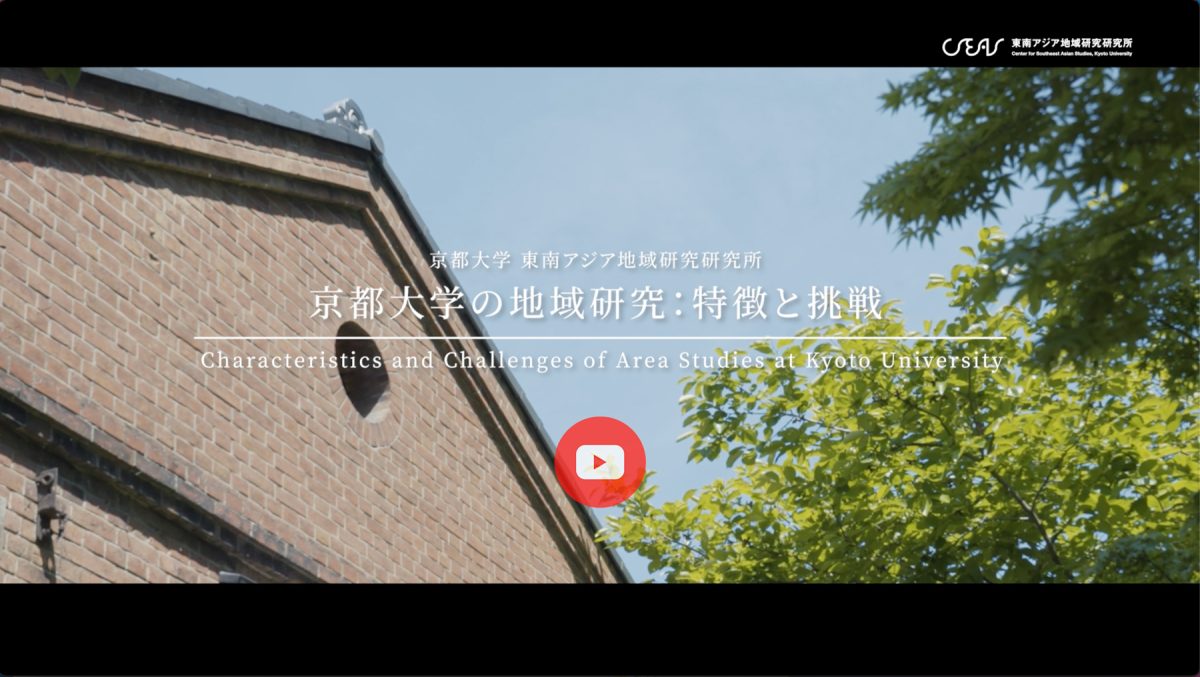
Area Studies at Kyoto University: Characteristics and Challenges
As a world-class center for Southeast Asian studies, our work provides leading innovations in this field’s research methodology. We talk about the features and challenges of area research.
History
On January 1, 2017, the Center for Southeast Asian Studies (CSEAS), integrated with the Center for Integrated Area Studies (CIAS) to relaunch as a new Center. The Center for Southeast Asian Studies was established as an intramural organization at Kyoto University in 1963 as a research department responsible for comprehensive research on Southeast Asia, and was followed by the Center for Southeast Asian Studies, which became a governmental organization in 1965. The Center for Integrated Area Studies was established in 2006 as a research department of Kyoto University based on the Japan Center for Area Studies, the National Museum of Ethnology, and its mission has been to integrate area information resources and promote correlated area studies. With a tradition of nearly 60 years of activity, the main pillars of the Center are Southeast Asian studies, global area studies, and the integration of area studies with informatics. There exists a strong need to create new dynamic academic institutions that go beyond the established fields of area studies and existent disciplinary frameworks. These should design guidelines for social development that meet present day challenges and solve myriad complex issues.
In 2009, the two former organizations were recognized as “Joint Usage/Research Center for the International Program of Collaborative Research (IPCR)” and “Joint Usage/Research Center for Information Resources of Area Studies” by the Ministry of Education, Culture, Sports, Science and Technology, respectively. In fiscal year 2022, the Institute was newly accredited as the “Joint Usage/Research Global Collaborative Research (GCR),” integrating and succeeding the above-mentioned activities. Since its inception, the Institute has been working to become the world’s center for Southeast Asian regional studies. In 2013, the Institute launched the Consortium for Southeast Asian Studies in Asia (SEASIA), calling on 11 institutions in Asia that are engaged in Southeast Asian studies, and is working to develop it as a core organization. CSEAS believes, more than ever before, that it is essential to bring together a greater diversity of knowledge through repeated discussions with researchers from an array of research fields with wide-ranging ideas and knowledge.
Organization
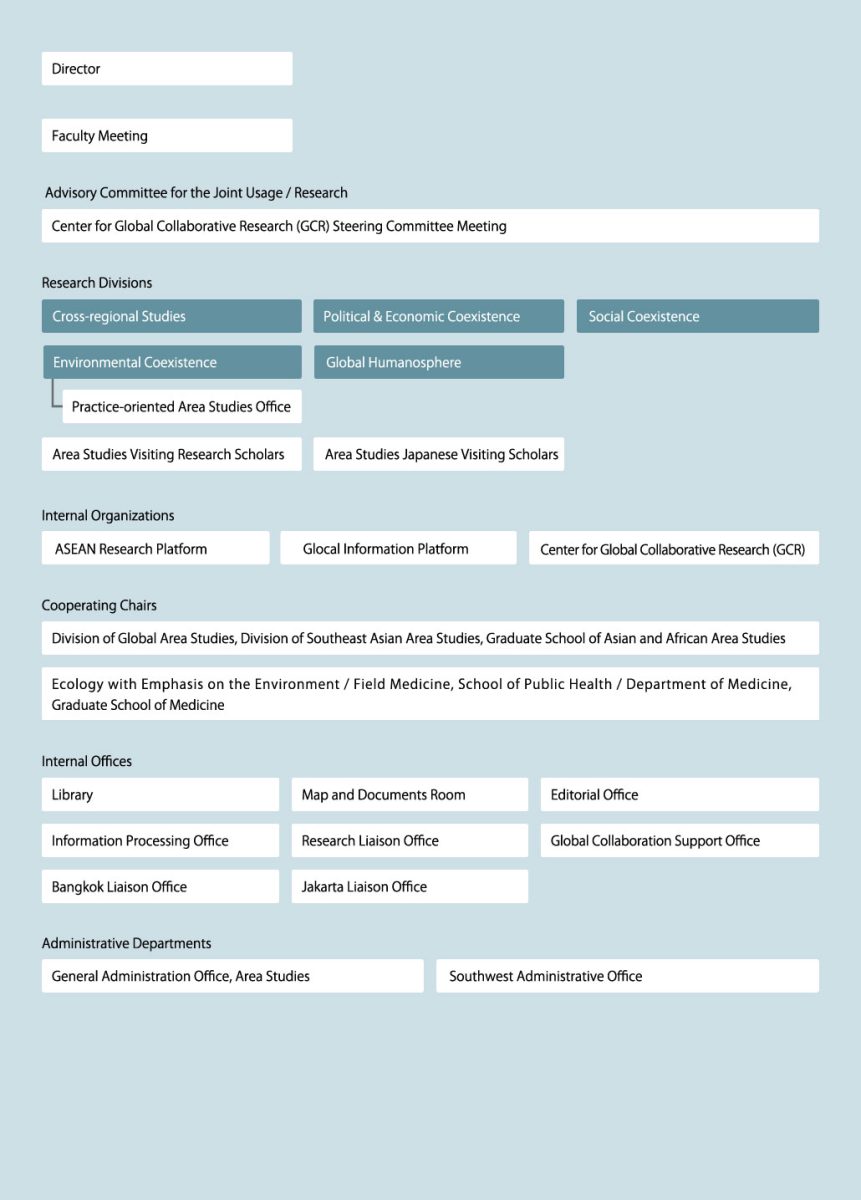
Research Divisions
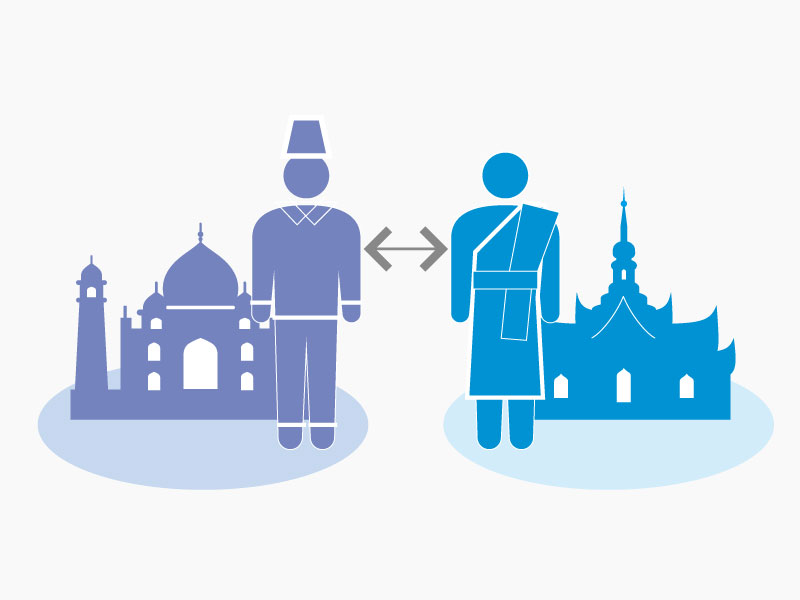
Cross-regional Studies
This division fosters area studies approaches through dynamic development of both information resources and pioneering studies at the cross-regional level. It aims to develop area studies that benefit the public sphere through basic research as well as social cooperation and practice-oriented research.
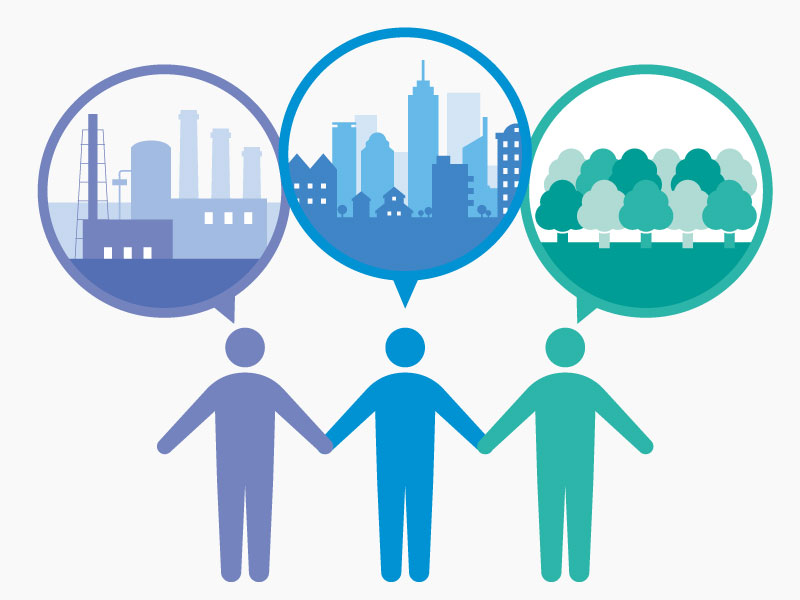
Social Coexistence
This division explores changing interactions among culture, society, and ecology in both contemporary and historical periods, aiming to advocate social coexistence among members of different societies in Southeast Asia and beyond. The division’s research covers a broad array of issues, including social, religious, and linguistic transformations; the politics of culture and knowledge production; family and gender; and sexuality.
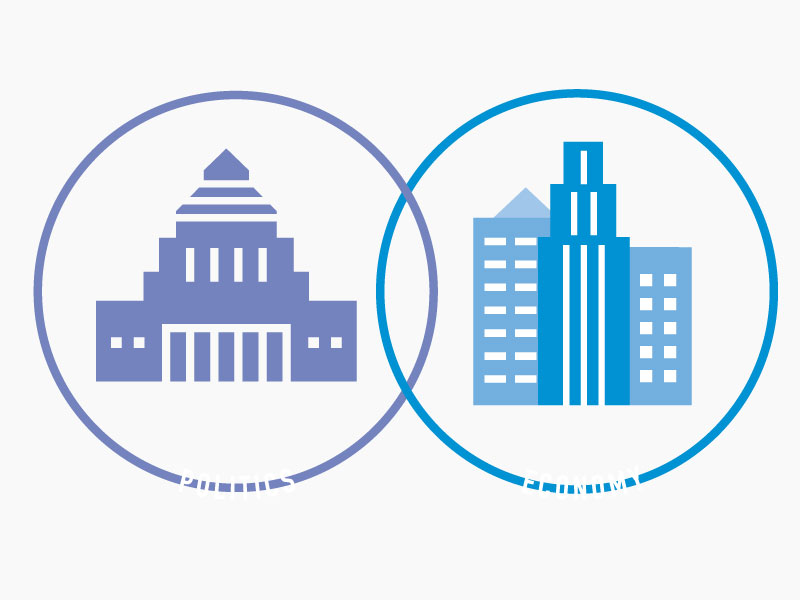
Political & Economic Coexistence
This division analyzes and develops relevant frameworks for studying and comparing dynamic political and economic transformations in Southeast Asia and beyond. Attempting both to understand the transformations and to concretely and constructively contribution to those regions, the division constantly collaborates with regional stakeholders.
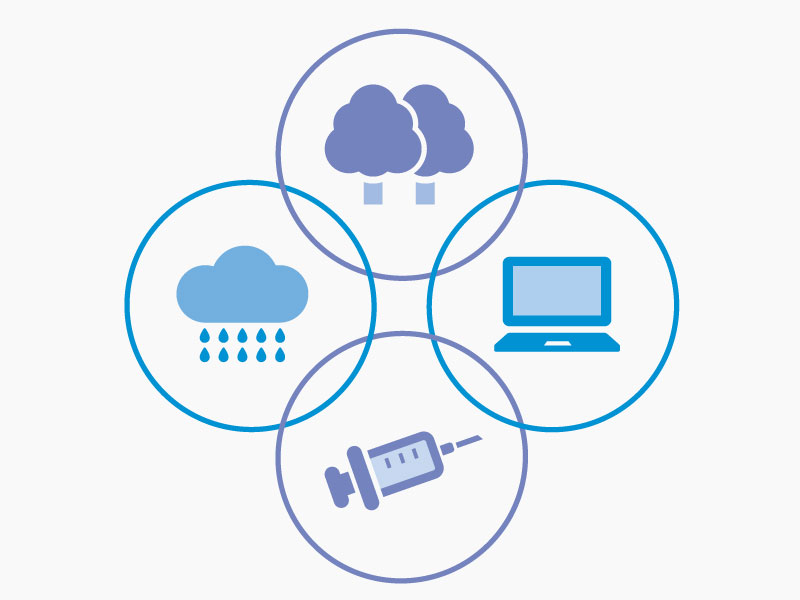
Environmental Coexistence
This division employs interdisciplinary approaches across the natural sciences, medical sciences, and informatics to study a wide variety of issues affecting the geosphere, hydrosphere, biosphere, and human sphere. These issues include ecological wellbeing, natural resources management, human and animal health as well as diseases in Southeast Asia and beyond. The division aims to develop knowledge and theories on the long-term sustainability of human societies and human-nature coexistence.

Global Humanosphere
This division engages in critical analyses of global transformations occurring in the twenty-first century. In its research on urgent economic, political, and socio-cultural issues, the division attempts to transgress contemporary disciplinary boundaries across the social and natural sciences, and aims to find pathways toward the coexistence of both the human and non-human communities.
Bangkok Liaison Office

The Bangkok Liaison Office was established in 1963, and its present location is in the Sukhumvit area in central Bangkok. The office has now expanded from its original base of Thai studies to the broader Mainland Southeast Asian studies, reflecting the shift of research interests of CSEAS staff and scholars’ community. The office has been managed by researchers that are selected from CSEAS staff as well as from other faculties, institutions and universities in Japan. The office functions as a residence for researchers and their families stationed there. It was originally established as a research lodgings for Japanese researchers in Thailand, but it performs a variety of functions today.
The office has three major functions. First, it is a base for information collection. Very important parts of the major collections of CSEAS, such as books in vernacular languages, statistics, documents, and maps have been collected by researchers at the office. It maintains regular contact for exchanging academic information with Thai research agencies like the National Research Council of Thailand, Chulalongkorn University, Thammasat University, Kasetsart University, Chiang Mai University, Khon Kaen University, and Maha Sarakham University and so on. The office also serves as a channel for various inquiries about local institutes from Japanese and other researchers and students.
Furthermore, it operates as a publicity and networking hub and researchers stationed there often organize workshops, seminars and hold receptions for scholars in Thailand and other regions in mainland Southeast Asia. In recent years, the office has been used for assisting various kinds of publicity activities of CSEAS as well as Kyoto University. These publicity activities based in the office definitely contribute to promote the credentials of Southeast Area Studies of CSEAS.
Finally, the office provides continual logistic support to field surveys including helping in negotiation with research counterparts in Thailand and attending to emergency measures. It is also a temporary storehouse of research document and equipment. Visitors can also use the rooms, internet service, and other facilities of the office for business meetings, preliminary discussions and analysis of data.
Access
12CD, GP Grande Tower, 55, Soi 23, Sukhumvit Rd,
Klongtoey Nua, Wattana, Bangkok, 10110 THAILAND
Tel +010-66-2-664-3707
Fax +010-66-2-664-3618
From Suvarnabhumi International Airport
TAXI
Limousine taxis are available at the airport service counter while there is a metered taxi booth on the ground floor. The fare for metered taxis is around 250 Thai Baht and you are also expected to pay the highway tolls. Fares for the limousine taxis are often three times higher than the metered taxis.
Estimated Time of Travel About 1 hour
Jakarta Liaison Office
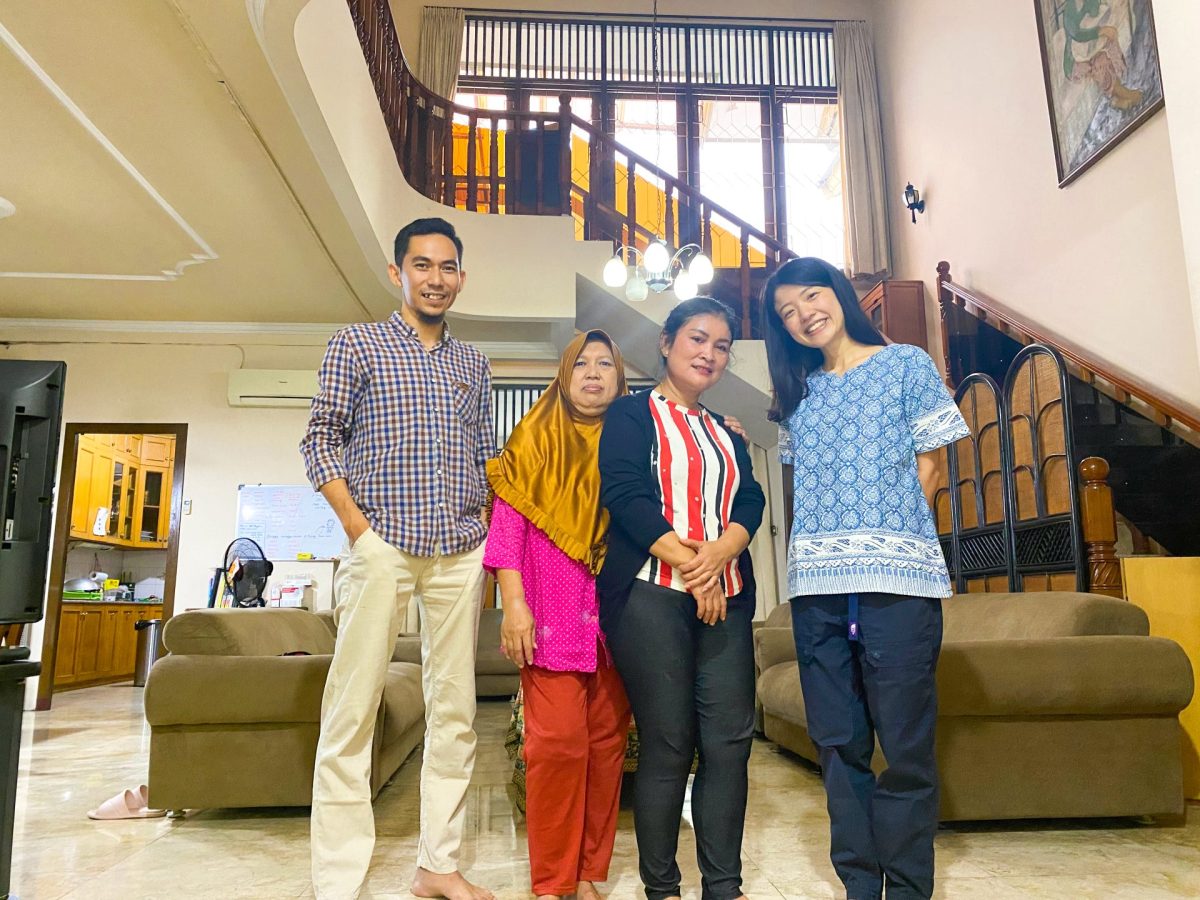
The Jakarta Residence was established in October 1970 at Jalan Rajasa, Kebayoran Baru, Jakarta, and has been funded by the Japanese government since 1973. It has three major functions: the promotion of joint research between Indonesian and Japanese or Japan-based researchers; the collection of research materials; and information and service assistance to Japanese researchers as well as Indonesian scholars.
Looking back over its history, the Jakarta Residence played quite a significant role in facilitating the 1986 Social and Economic Survey of South Sumatra by the National Institute of Economic and Social Research (LEKNAS) and CSEAS. Since then, the residence has continued to facilitate a number of research collaborations with academic institutions in Indonesia. CSEAS has signed memoranda of understanding (MOU) for research and educational collaboration with the Indonesian Institute of Science (LIPI), Hasanuddin University, Bogor Agricultural University, and the Geospatial Information Agency (BIG), Syarif Hidayatullah State Islamic University and many other institutions.
In 1983, the Center started a special project to acquire materials in vernacular languages, mainly Southeast Asian, with funding provided by the Japanese Ministry of Education, Science, and Culture. Since then, the residence has collected materials written in Indonesian, Javanese, Sundanese, and other Indonesian vernacular languages, as well as in Dutch. The residence has also amassed a growing number of documents on Indonesian statistics and maps. Through the efforts of faculty and scholars residing in Jakarta, CSEAS now has the largest collection on Indonesia in Japan
The residence also assists Japanese CSEAS researchers and other faculties, institutions, and universities to obtain research permits and has supported their research activities in Indonesia in a variety of ways. It functions as the networking hub of Japanese researchers not only in Indonesia, but also other regions in insular Southeast Asia. For Indonesian students and researchers, they can receive services and information about studying and doing research in Japan as well.
Access
Jl. Kertanegara No. 38 Kebayoran Baru, Jakarta Selatan, Jakarta 12180, INDONESIA
Tel: +62-21-7262619
Fax: +62-21-7248584
From Soekarno Hatta International Airport
TAXI
Purchase a ticket for Golden Bird Taxi at the taxi counter in the airport, and inform the person in charge of your destination.
Take the taxi at the Golden Bird taxi stop outside the airport. You might have to pay expressway tolls a couple of times on the way in addition to the taxi fare.
BUS
Take the bus bound for “BLOK M.” Get off at the last stop (“BLOK M”) and take a bajaj (three wheeler) to reach Jakarta residence.
